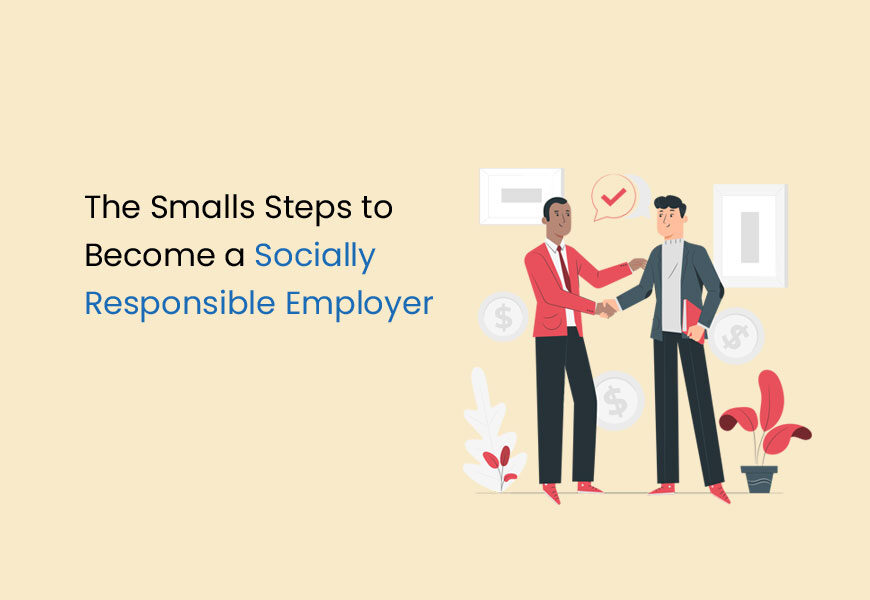What comes to mind when you hear the term socially responsible employer? In all probability, you are thinking about CSR or corporate social responsibility that companies are mandated to engage in. Companies with the specified annual turnover are required to spend 2% of their 3-year-average net profits on CSR activities, giving back to society and aiding holistic social development.
But this is just a very narrow and restrictive way of defining social responsibility. Being a socially responsible employer should not be limited to CSR activities and big corporations alone. There is great value for all employers when they are socially responsible, regardless of their size, scale or nature of the operation. It is as valuable to an individual employing household staff or a home enterprise employing support staff or a platform employing gig workers as it is to a big corporation.
If not CSR, then what does it mean to be a socially responsible employer? How is it valuable to individuals, MSMEs and e-commerce companies who employ informal workers? How can someone become a socially responsible employer? Keep reading to find out.
Who is a Socially Responsible Employer?
To be a socially responsible employer means using the resources at one’s disposal to contribute to the greater good. It is about contributing to the long-term, sustainable development and welfare of the employees and society at large.
A socially responsible employer may have one or more of the following characteristics.
- Show sensitivity and empathy towards the needs of the employee.
- Always take into account the expectations of all stakeholders – the customers, employees, local economy, society and so on.
- Show genuine care and concern for the overall well-being of the employees and their families.
- Offer social security and other benefits to employees in addition to proper compensation, enabling employees to gain a sense of financial security.
- Follow ethical practices and consciously ensure safe, decent work conditions while always respecting human rights.
- Make wise business decisions that don’t aim at short-term monetary benefits but long-term positive impacts on the business, its employees, the society and the environment.
- Ensure compliance with regulatory practices, laws and international and industry best practices.
Benefits of Being a Socially Responsible Employer
While being socially responsible is a regulatory requirement for big businesses, how does it help a small enterprise, a home business or even an individual employer?
If you are a business owner, however big or small, being socially responsible is an important investment that yields more than just goodwill. It enables businesses to build the crucial-yet-ignored social capital. Social capital, which includes trust, reputation and legitimacy, bolsters the overall business image and brand. You can stand out amid the growing clutter and noise in the market.
Customers appreciate brands and businesses that display positive social values; they engage and associate more with such brands. In fact, 67% of customers are willing to try a product when the brand has a good reputation. 66% of customers are even willing to pay more for products based on sustainability values, display of positive social values and so on. 81% of millennials expect brands to be good corporate citizens. By investing in social responsibility, you are increasing customer trust, loyalty and retention.
Social responsibility initiatives as a business or simply providing social security benefits to your household staff help you build trusting, long-term relationships with employees. Your employees, especially informal and casual workers, will feel cared for and their loyalty and trust towards you will increase. Since their welfare is taken care of with benefits and good working, employee absenteeism and attrition will reduce while morale and productivity will improve.
Let us take an example of the growing number of gig workers engaged in food and product delivery services for online businesses. They are known to have little to no benefits; they are underpaid, overworked and have little job security. Amid such circumstances, if you offer benefits to your delivery workers, it will reflect positively on your business.
You will be seen as an ethical and caring employer. Your employees will give positive feedback about your business, and this will help you attract and retain good talent. And this positive image will also help you stand out as a socially responsible business, attracting more loyal customers.
Small Steps to Become a Socially Responsible Employer
Start providing social security benefits to your employees… That is the simplest starting point to becoming a socially responsible employer. Whether you are an individual, a home business, MSME, an online platform or a big corporate house, providing social security benefits goes a long way in helping your employees and your employer brand.
Social security is a contribution-based system/ programme, often established by legislation, to enable employees and their households to achieve a level of financial stability. Here are some of the social security benefits you provide must include the following:
- Healthcare benefits to ensure your employees and their families gain access to preventive and curative medical care.
- Maternity benefits to reduce the care gap for women workers, especially in informal employment.
- Disability benefits and reimbursements in case of permanent or temporary disablement caused at work due to accidents/ injuries.
- Insurance and survivorship benefits to dependents of an employee after their death. This way, families will be able to cope financially.
- Retirement benefits including pensions and gratuity to ensure that employees’ quality of life doesn’t erode post-retirement. They will have savings to make ends meet.
Social security benefits offer a safety cushion for employees to fall back on when there is a socio-economic eventuality, natural disaster, medical emergency or an involuntary loss of income. They do not have to depend on their employer or a loan shark to help them make ends meet in such events.
This is especially important for informal workers like domestic workers, household staff, drivers, gig workers, casual labourers, platform workers, home nurses and so on. They have little to no job security, no savings and lots of out-of-pocket expenses. So, social security benefits improve their standard of living and quality of life.
In India, 93% of the workforce is in informal employment and have no social protection. So, the risk of them falling (deeper) into the clutches of poverty is high after a sudden hospitalization, a natural disaster or a global pandemic. You will enable your employees to maintain their quality of life when you provide social security.
By providing social security, you also enable employees and their families to gain guaranteed access to healthcare. Further, without out-of-pocket medical expenses, employees can save more and use their savings for their children’s education or other important life expenses. The retirement benefits ensure that your employees don’t slip into poverty as they age.
Overall, you will contribute to the greater societal good and progress by making a small contribution towards the social security of your employees. You will also help formalizing work and ensure the financial security of informal workers.
The Way Forward: How to Start Paying Social Security Benefits?
Now, you know paying social security benefits is the simplest, most effective way to becoming a socially responsible employer. Wondering how to get started?
Leverage the Tankhapay app to start paying comprehensive social security benefits to all your employees. Know more.
Or
Download the TankhaPay app now





















